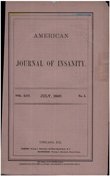Gender, type of treatment, dysfunctional attitudes, social support, life events, and depressive symptoms over naturalistic follow-up
Abstract
OBJECTIVE: The present study investigated gender differences in depressive symptoms during a naturalistic follow-up for outpatients with major depressive disorder in the National Institute of Mental Health Treatment of Depression Collaborative Research Program. Specifically, the study investigated whether gender interacted with type of treatment received, dysfunctional attitudes, life events, or social support to predict severity of depressive symptoms. In addition, aspects of these psychosocial factors (need for approval, interpersonal life events, and close friendships), hypothesized to be more salient for women, were examined to determine if they had a differential impact on level of depressive symptoms in men and women. METHOD: Assessments conducted 6, 12, and 18 months after treatment included measures of depressive symptoms, dysfunctional attitudes, current life events, and social support. Data were available for 188 subjects (134 women and 54 men). Regression analyses were conducted to examine whether gender as a main effect, or interacting with dysfunctional attitudes, life events, social support, or subtypes of these variables, predicted cross- sectional or longitudinal measures of depressive symptoms during follow- up. RESULTS: A consistent finding of the study was that over the 18 months of this naturalistic follow-up, there were no main effects for gender or any significant interactions involving gender and any of the variables of interest. The study demonstrated that life events and social support were related to severity of depressive symptoms for both genders. CONCLUSIONS: Despite differential prevalence rates of major depression for men and women, findings do not support a different process in outcome of illness for men and women.
Access content
To read the fulltext, please use one of the options below to sign in or purchase access.- Personal login
- Institutional Login
- Sign in via OpenAthens
- Register for access
-
Please login/register if you wish to pair your device and check access availability.
Not a subscriber?
PsychiatryOnline subscription options offer access to the DSM-5 library, books, journals, CME, and patient resources. This all-in-one virtual library provides psychiatrists and mental health professionals with key resources for diagnosis, treatment, research, and professional development.
Need more help? PsychiatryOnline Customer Service may be reached by emailing [email protected] or by calling 800-368-5777 (in the U.S.) or 703-907-7322 (outside the U.S.).



